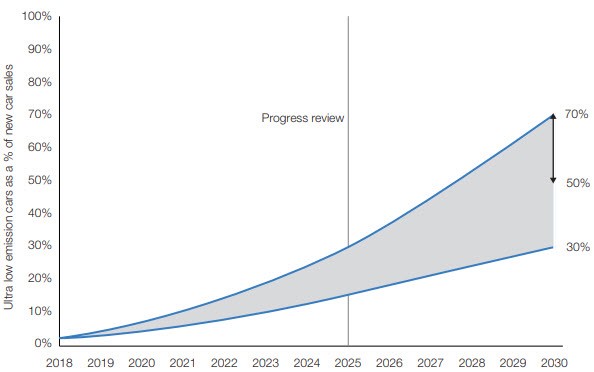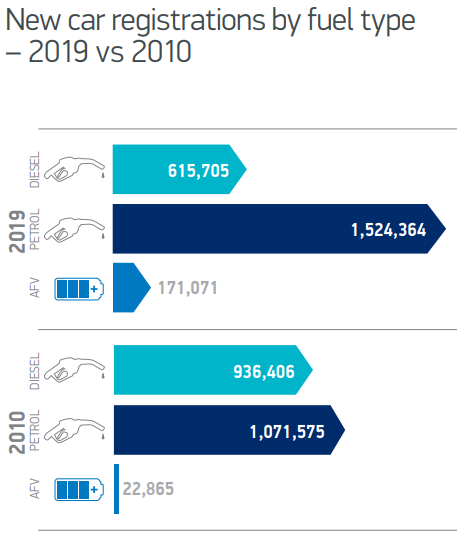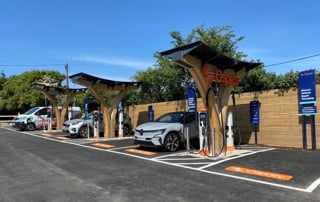
Fleet FAQ
Q:
What is the Government's Road to Zero strategy?
A:
The 'Road to Zero' is a document that outlines the Government's long-term strategy to transition to zero-emission road transport by 2030, while reducing emissions during the transition (source: Pod-Point).
In July 2018 the Government launched its Road to Zero strategy.
Ambitions:
- At least 50% — and as many as 70% — of new car sales and up to 40% of new vans to be ultra low emission by 2030
- Enable a "massive" roll-out of infrastructure to support electric vehicle adoption
- Set the stage for the "biggest technology advancement in the UK road network since the invention of the combustion engine".
Graph: Ultra low emission car uptake trajectory as a percentage of new car sales

New petrol and diesel cars and vans will not be allowed to be sold in the UK from 2030, the Government has confirmed.
It however, said that it will allow the sale of hybrid cars and vans that can drive a significant distance with no carbon coming out of the tailpipe until 2035, suggesting that the five-year extension will only apply to plug-in hybrid electric vehicles (PHEVs).
The Road to Zero strategy will build on this commitment and outlines how government will work with industry to support achieving this.
The Road to Zero strategy is technology neutral and does not speculate on which technologies might help to deliver the Government’s ambitions.
The Government has no plan to ban any particular technology as part of this strategy.
It has committed to investing £1.5 billion in ultra low emission vehicles by 2020 and the Road to Zero strategy outlines a number of ambitious measures including:
- A push for chargepoints to be installed in new build homes, where appropriate, and new lampposts to include charging points
- The launch of a £400 million charging infrastructure investment fund to help accelerate the roll-out of charging infrastructure by providing funding to new and existing companies that produce and install charge points. A new £40 million programme will be created to develop and trial "innovative, low cost wireless and on-street charging technology"
- Providing up to £500 for electric vehicle owners to put in a charge point in their home through the electric vehicle homecharge scheme. And an increase in the value of grants available to workplaces to install chargepoints so people can charge when they are at work
- The extension of the plug-in car and van grants to at least October 2018 at current rates, and in some form until at least 2020, allowing consumers to continue to make significant savings when purchasing a new electric vehicle
- The launch of an electric vehicle energy taskforce to bring together the energy and automotive industries to plan for the increase in demand on energy infrastructure that will result from a rise in the use of electric vehicles
- The Government is also taking powers through the Automated and Electric Vehicles Bill to ensure chargepoints are easily accessed and used across the UK, available at motorway service areas and large fuel retailers.
Poilcy summary
Reducing emissions of vehicles already in use
- Increasing the supply and sustainability of low carbon fuels in the UK through a legally-binding 15-year strategy to more than double their use, reaching 7% of road transport fuel by 2032
- Taking action against garages offering the removal of emissions reduction technology, working with the DVSA, VCA and industry to ensure the regulatory and enforcement regimes give the measures we needed to tackle this problem
- Extending the Clean Vehicle Retrofit Accreditation Scheme (CVRAS) beyond buses, coaches and HGVs to include vans and black cabs
- Accelerate the adoption of fuel-efficient motoring by company car drivers, businesses operating fleets, and private motorists
Drive the uptake of the cleanest new vehicles
- Taking an approach as the UK leaves the European Union that is at least as ambitious as the current arrangements for vehicle emissions regulation
- Continuing to offer grants for plug-in cars, vans, taxis and motorcycles until at least 2020. The plug-in car and van grants will be maintained at the current rates until at least October 2018. Consumer incentives in some form will continue beyond 2020
- Consulting on reforming Vehicle Excise Duty to incentivise van drivers to make the cleanest choices when purchasing a new van
- Ensuring 25% of the central Government car fleet is ultra low emission by 2022 and that all new car purchases are ultra low emission by default. Committing to 100% of the central Government car fleet being ultra low emission by 2030
- Launching a 2018/19 Go Ultra Low campaign and continuing to work with industry on consumer communications about ultra low emission vehicles until at least 2020
- Setting up a new road transport emissions advice group, bringing government, industry and consumer groups together to help ensure clear and consistent consumer messaging and advice on fuel and technology choices
- Legislating to enable government to compel vehicle manufacturers to recall vehicles for an environmental nonconformity or failure, and to make tampering with emissions control systems a legal offence
- Supporting the early market for used ultra low emission vehicles by producing guidance, funding training and making appropriate changes to the DVLA V5 documentation
- Launching a call for evidence on particulate emissions from tyre, brake and road wear to improve our understanding of these emissions and consider options for how they might be reduced
- Continuing to take a technology neutral approach to meeting our ambitions.
 Graph: New car registrations by fuel tupe - 2019 vs 2010
Graph: New car registrations by fuel tupe - 2019 vs 2010
Reduce emissions from heavy goods vehicles (HGVs) and road freight
- Introducing a new voluntary industry-supported commitment to reduce HGV greenhouse gas emissions by 15% by 2025, from 2015 levels
- Launching a joint research project with Highways England to identify and assess zero emission technologies suitable for HGV traffic on the UK road network.
- Working with industry to develop an ultra low emission standard for trucks
- Undertaking further emissions testing of the latest natural gas HGVs to gather evidence that will inform decisions on future government policy and support for natural gas as a potential near-term, lower emission fuel for HGVs.
Support the development of "one of the best electric vehicle infrastructure networks in the world"
Launching a £400 million charging infrastructure investment fund to help accelerate charging infrastructure deployment.
Taking powers through the Automated and Electric Vehicles Bill to ensure that charge points are:
1. available at motorway service areas and large fuel retailers;
2. easily accessed and used across the UK.
This includes powers to provide a uniform method of accessing public chargepoints and refuelling points; make certain information publicly available in an open and transparent format and set reliability standards; and that chargepoints are smart ready by giving government powers to set requirements prohibiting the sale or installation of chargepoints unless they meet certain requirements.
- Ensuring new-build houses are electric vehicle ready. It is the Government's intention that all new homes, where appropriate, should have a chargepoint available. It plans to consult as soon as possible on introducing a requirement for chargepoint infrastructure for new dwellings in England where appropriate.
- Future-proofing our streets. We want all new street lighting columns to include charging points, where appropriately located, in areas with current on-street parking provision.
- Continuing to provide grant support through the Electric Vehicle Homecharge Scheme (EVHS) until March 2019, with installations becoming smart enabled.
- Increasing the grant level of the Workplace Charging Scheme from £300 per socket to 75% of the purchase and installation costs of a chargepoint capped at a maximum of £500 per socket.
- Reviewing the provision of residential chargepoint infrastructure for those who have communal parking facilities, or do not own their own home.
- Investing £4.5m in the On-street Residential Chargepoint Scheme until 2020.
- Consulting in summer 2018 on a proposal to increase the height limit for the permitted development right in England for the installation of electric vehicle chargepoints in designated off-street parking spaces.
- Ensuring local planning policies incorporate facilities for charging electric vehicles via the national planning policy framework.
- Consulting on amending building regulations to require relevant charging provision in new non-residential buildings.
- Launching the process for a R&D programme of up to £40m by summer 2018 to develop and trial innovative, low cost wireless charging and public on-street charging solutions that can be deployed across entire residential streets.
- Continuing to future proof the strategic road network by running a pilot to increase electrical capacity at a motorway service areas working with Highways England.
- Launching an electric vehicle energy taskforce to bring together the energy and automotive industries, in order to plan for future electric vehicle uptake and ensure the energy system can meet future demand in an efficient and sustainable way.
- As part of the forthcoming call for evidence on last mile deliveries, gathering further evidence of any key network connection infrastructure barriers, which may prevent further uptake of ultra low emission vehicles, specifically for fleet operators.
- Launching an electric vehicle chargepoint design competition.
- Monitoring market developments to determine whether any significant gaps in charging infrastructure provision appear over the medium term, and considering whether there may be a case for direct central government support in areas of market failure, which may include rural areas
Transport secretary Grant Shapps (pictured), said (November 18, 2020): "The UK is going further and faster than any other major economy to decarbonise transport, harnessing the power of clean, green technology to end the UK’s contribution to climate change by 2050.
Bringing forward the phase-out date could create 40,000 extra jobs by 2030, particularly in our manufacturing heartlands of the North East and across the Midlands, and will see emissions reductions equivalent to taking more than 4 million cars off the road.
We are also leading the charge when it comes to the transition to zero emission vehicles and today’s timely boost in funding builds on our world -leading £2.5 billion package to encourage drivers to make the switch."
MORE:
Road to Zero strategy document (pdf)
Electric vehicle homecharge scheme
Workplace charging point installation














